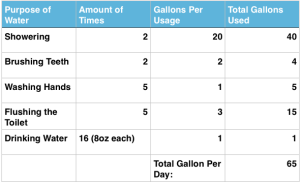Coming from the country, my family and I have always been mindful about the amount of water we use on a daily basis. Since we are not connected to a public water system we have to use a system known as a drilled well. The well was dug with a rotary style drilling machine so that it could make a hole several hundred feet down in the ground to reach the water bed. Rain water seeps down into the ground to replenish the well, which in turn is brought into my house through the use of an electric pump. We use this water for everything: drinking, bathing, going to the bathroom, and doing the dishes. My family has to make sure we conserve as much water as possible so that the well doesn’t run dry and we aren’t left without water. Any excess water that we use goes straight into a septic tank that is buried in the back yard. Any waste material is broken down in the tank by bacteria and the water flows out into a drain field where it is filtered trough gravel and absorbed by the ground again.
Going from using 65 gallons of water per day to using 2 gallons was challenging even though it was only temporary. My primary focuses were to use the water for hygiene and consumption. I did take a shower but rather than keep the water running I only used it to rinse off which took about 30 seconds meaning that I had used approximately half a gallon already. I used about another half gallon to brush my teeth once, leaving me with only one more gallon left and it was only 9am. The rest of the day I was very careful with how I used my limited supply of water. I avoided flushing the toilet which for us here in the U.S. is unsanitary but for someone in Mozambique or Haiti is a luxury just to have indoor plumbing. I also drank about half a gallon of water throughout the day which did suffice since I am a relatively smaller person and don’t need to consume as much. I avoided washing my hands, substituting the water for those small disinfectant sheets you would put in a travel bag or maybe take camping. During the evenings I usually go to the gym but avoided it for this experiment so that I did not need to take another shower. Overall the day was long and difficult without using the amount of water I am accustomed to; I was able to do it but I was cutting it close to 2 gallons. I have a greater appreciation for people living in developing countries who do not have the same resources that I have. I now see the importance of conserving water and how vital it is to the preservation of life and the environment.


Hi Matthew, my name is Jake Segall. Here is a link to my post!
http://geog030.dutton.psu.edu/2016/02/10/water-tracking-and-usage-jake-segall/
I like the ways you tried to save water (turning the shower on only to rinse off, using disinfecting wipes instead of washing your hands, etc.). Innovative ways like this, if adopted by a large portion of the population, could lead to having a smaller footprint on the available water for us. I think some of us, like me, do not have an appreciation for water conservation coming from an area where it is not as big of a deal as it is in others. Even the surrounding areas (I was born in State College) may have to be more mindful than I have ever been about my water usage, which I never even thought about. I think it is pretty impressive that you were able to cut down to two gallons a day, as I was not successful.
Another well user! I think it is interesting that you are more water conscious because you use a well whereas I think I am less water conscious because I don’t have to pay for extra water. I still think it is impressive that you used 65 gallons because I had used 115 gallons. Looking at our differences I had a clothes washer going but to be honest, that is usual for us because my husband likes to do all of his colors separately. This exercise definitely makes you realize how spoiled we actually are! Thanks for sharing!
Karolina Powell
Here is a link to my blog: http://geog030.dutton.psu.edu/2016/02/10/karolina-powell-lesson-4/
Hello Mathew, my name is Megan, and from what I’ve read we have quite a few similarities. I live on a farm, so we also have a well for the house, however our septic is pumped annually. I’ve never heard of a drain field used like that. If you’d like to read my post, here is the link: http://geog030.dutton.psu.edu/2016/02/06/water-tracking-of-petersburg-and-usage-by-megan-shrout/
Considering your usage, your ability to cut down to 2 gallons a day was astonishing to me. I use a little more than half of your water usage a day (on average), and I couldn’t get down to that amount. By using alternative resources, like using sanitation wipes instead of water to wash your hands, you lessened the need for water in your daily routine, which is something I had not thought of. If the situation arose where you needed to preform such measures, I am curious as to how the demand for such things as sanitation wipes would effect the cost along with its environmental impacts.
Thank you for an enjoyable read!